French elections: What would a Le Pen or Macron win mean for Germany?
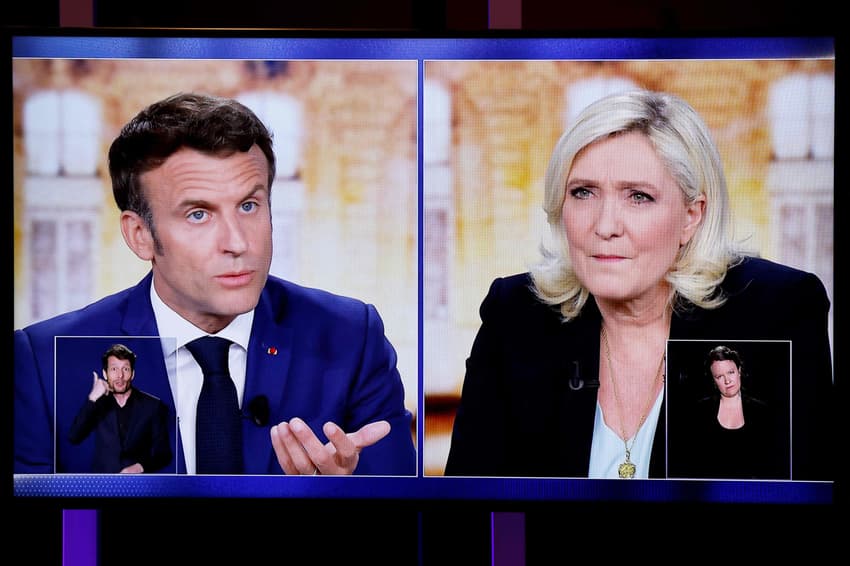
France will go to the polls on Sunday in a nail-biting showdown between the liberal Emmanuel Macron and far-right Marine Le Pen. What would the ramifications of a win for either of them mean for Germany?
On Sunday, April 24th, the French electorate will face a choice between two radically different politicians: the liberal centrist Emmanuel Macron and the far-right EU-sceptic Marine Le Pen.
In some ways, the situation appears to be very similar to the one that arose five years ago. Both of the same politicians are facing off against each other in the final round of the presidential elections, and Macron appears to have a slight edge over his opponent.
However, the past half a decade has seen Macron battle crisis after crisis, from the Ukraine war to the 'Yellow Vests' protests and the Covid pandemic. That, along with his reputation as a "president of the rich", has taken the shine off his image significantly.
Russia's Ukraine invasion has also cast Le Pen's campaign in a new light. Her party, Rassemblement National, received a €9 million and €2 million loan from Russian-based bank that helped fund her 2017 election campaign. According to imprisoned Russian opposition politician Alexey Navalny, "the bank is Putin's notorious money-laundering outfit".
With the situation made even more tense by the ongoing war on European soil, this could be a decisive election not only for France, but Germany and Europe as a whole. Here's what you need to know.
What do the latest polls say?
According to The Independent, Macron maintained a 12-point lead over Le Pen as the two entered the final stretch of the election campaign on Friday. Politico's poll of polls placed the two politicians closer together, with Le Pen on 45 percent and Macron on 55 percent.
The decisive question on election day will be how many left-wing voters are able to hold their nose and vote for the centrist to stop Le Pen getting in, and how many would-be voters will ultimately stay home. At the moment, pollsters are predicting a historically low turnout on Sunday, with 80 percent of the French electorate describing the campaign as "poor quality" so far.
What would a Macron victory mean for Germany?
- The European "power couple"
Macron's party, En Marche, is a notoriously pro-EU party and the liberal politician has maintained close links with Germany throughout his time in government.
In fact, former Chancellor Angela Merkel had such a friendly relationship with Macron that the two were considered something of a European Traumpaar (dream couple) when Merkel was still in power. His perceived Germanophilia was so strong that there was even a conspiracy theory that he intended to give the Alsace-Lorraine region, which was previously seized by the Germans in the Franco-Prussian war, back to his neighbour.
READ ALSO: ‘France loves you’ – Macron hosts Merkel for farewell visit
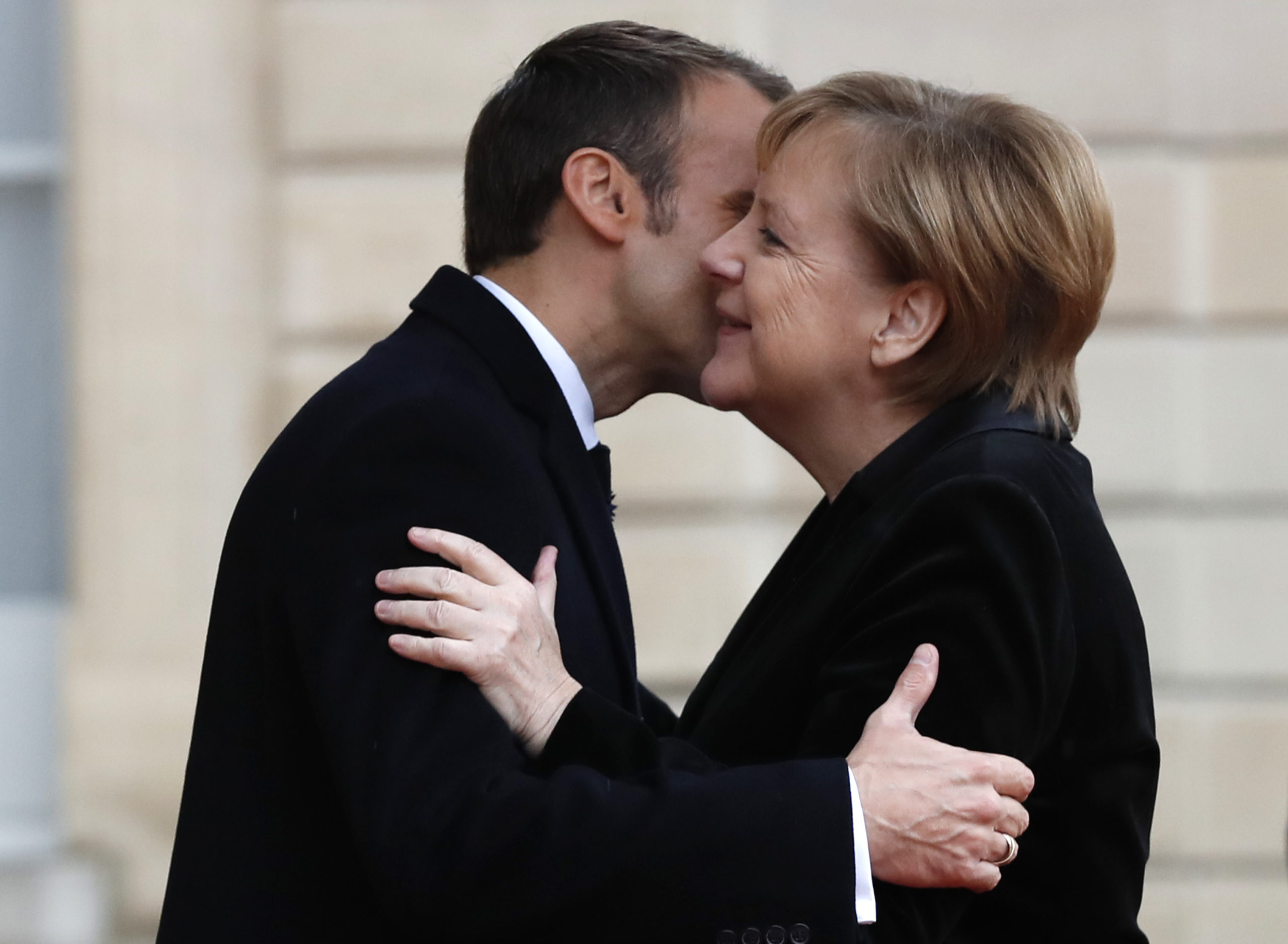
Merkel and Macron share a warm embrace in Paris in 2018. Photo: picture alliance/dpa | Thibault Camus
Though this is clearly nonsense, the two countries have maintained close links in spite of Germany's change in leadership. When Olaf Scholz (SPD) took the reins of Europe's largest economy, his first diplomatic visit was a lunch date with Macron.
"This visit is a very important moment for building the solid foundations of cooperation between our two countries," Macron said at the time. "Not only for the bilateral relationship itself, but also to discuss European issues, the major international issues."
In a televised election debate on Wednesday, the centrist politician reiterated this view.
"We need a stronger Europe," he said. "This requires a strong Franco-German pair."
He also spoke of the Pfizer/BioNTech vaccine, which was developed in a German laboratory and packaged on French soil, as an example of the strength of Franco-German collaboration.
In his closing speech, Macron said that next Sunday's election was also a plea "for or against the EU, for or against Franco-German relations".
A win for Macron would be very much a win for pro-EU politics in general and would undoubtedly see a continuation of the Franco-German power couple in Europe.
- United stance on Russia
Announcing a wave of sanctions against Russia after its brutal invasion of Ukraine, EU Commission President Ursula von der Leyen said: "If Putin was seeking to divide the European Union, to weaken NATO, and to break the international community, he has achieved exactly the opposite. We are more united than ever and we will stand up in this war, it is for sure that we will overcome and we will prevail. We are united and we stay united."
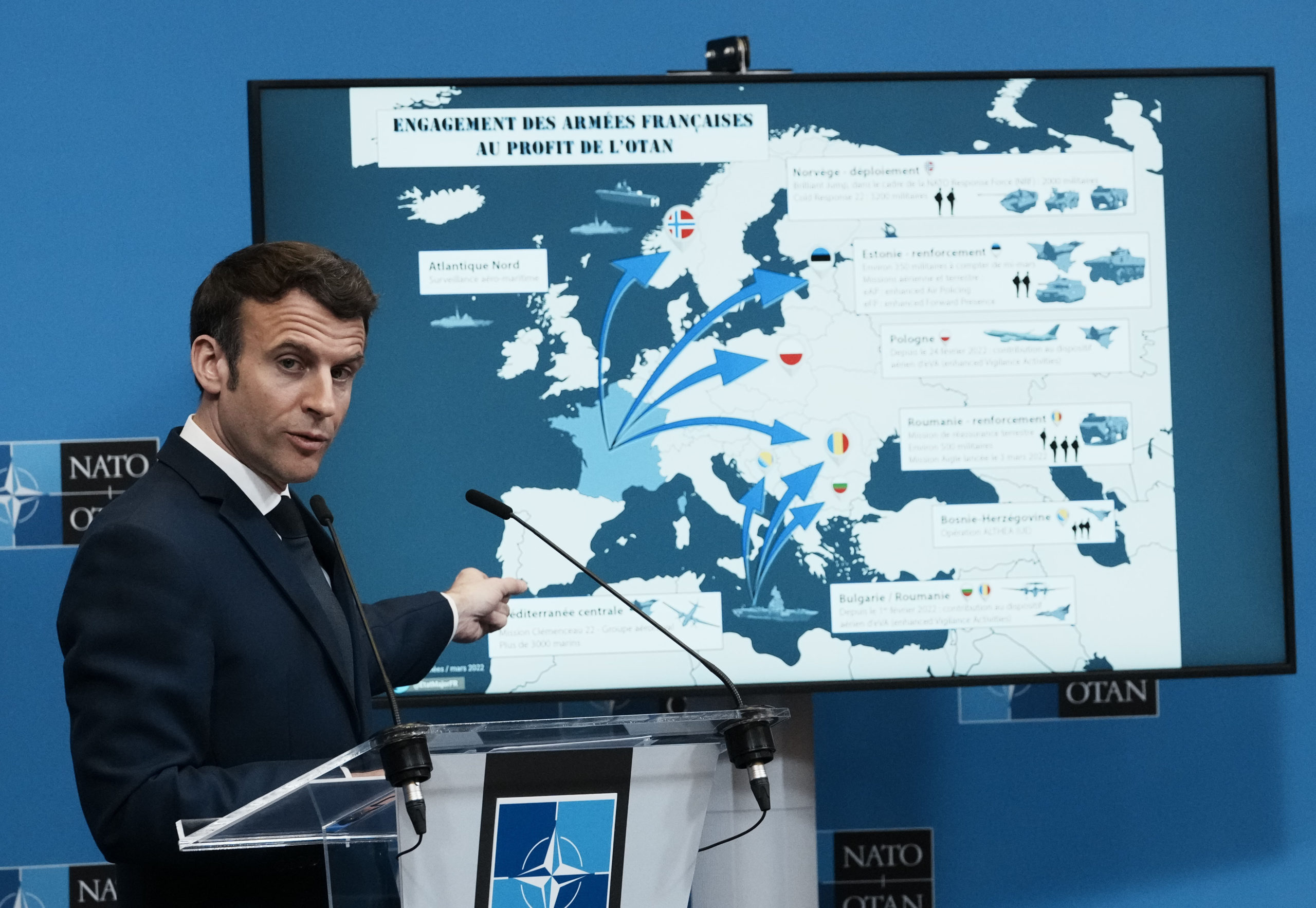
French president Emmanuel Macron speaks at a NATO summit in Brussels. Photo: picture alliance/dpa/AP | Thibault Camus
If Macron wins a second election in France, the signs are that this will continue to be true. France has so far been in favour of tough economic sanctions against Putin and his oligarch network, as well as the delivery of weapons to support Ukraine's fight against its aggressor. Macron has also long been in favour of establishing a European army, and the war in Russia appears to have shored up his ambitions for common defence policies across the bloc.
“We can no longer depend on others to feed us, care for us, inform us, finance us,” Macron said in a speech in March. “We cannot depend on others to defend us, whether on land, at sea, under the sea, in the air, in space or in cyberspace. In this respect, our European defence must take a new step forward.”
READ ALSO: ANALYSIS: Just how quickly could Germany wean itself off Russian gas?
And what would a Le Pen victory mean for Germany?
- Tense Franco-German relations
A win for the Le Pen would mark a sea change after years of close collaboration between France and Germany, and indeed within Europe. "She hates Germany," was the blunt assessment of French political scientist Henri Ménudier on Deutschlandfunk this week.
According to Ménudier, Le Pen is furious at what she sees as Germany's overly dominant political and economic role within the EU. In Wednesday's TV debate, she fumed over the fact that German cars were, in her view, given preference over French ones. "The Germans are putting their foot down hard," she said.
Most notably, the far-right politician has next to no political allies or links in Germany, aside from the anti-migrant AfD. In one of her first speeches on foreign policy in the election campaign, she said she wanted to end the "French blindness towards Berlin" that had existed during the Merkel and Macron years.
- Breakdown of the EU?
According to some experts, a win for Le Pen could be the start of the disintegration of the European project. Though the right-winger has said she doesn't intend to take France out of the European Union, some believe her plans for fundamental EU reform could amount to a Frexit-by-stealth.
Le Pen wants to drastically reduce the amount of money France sends to Brussels - a policy which is bound to put her on a collision course with both the EU Commission and Germany. She has also said that French law should take precedence over EU law to free the country from the "straightjacket of Brussels". She wants to erect hard borders around France and end the free movement of people, goods and services.
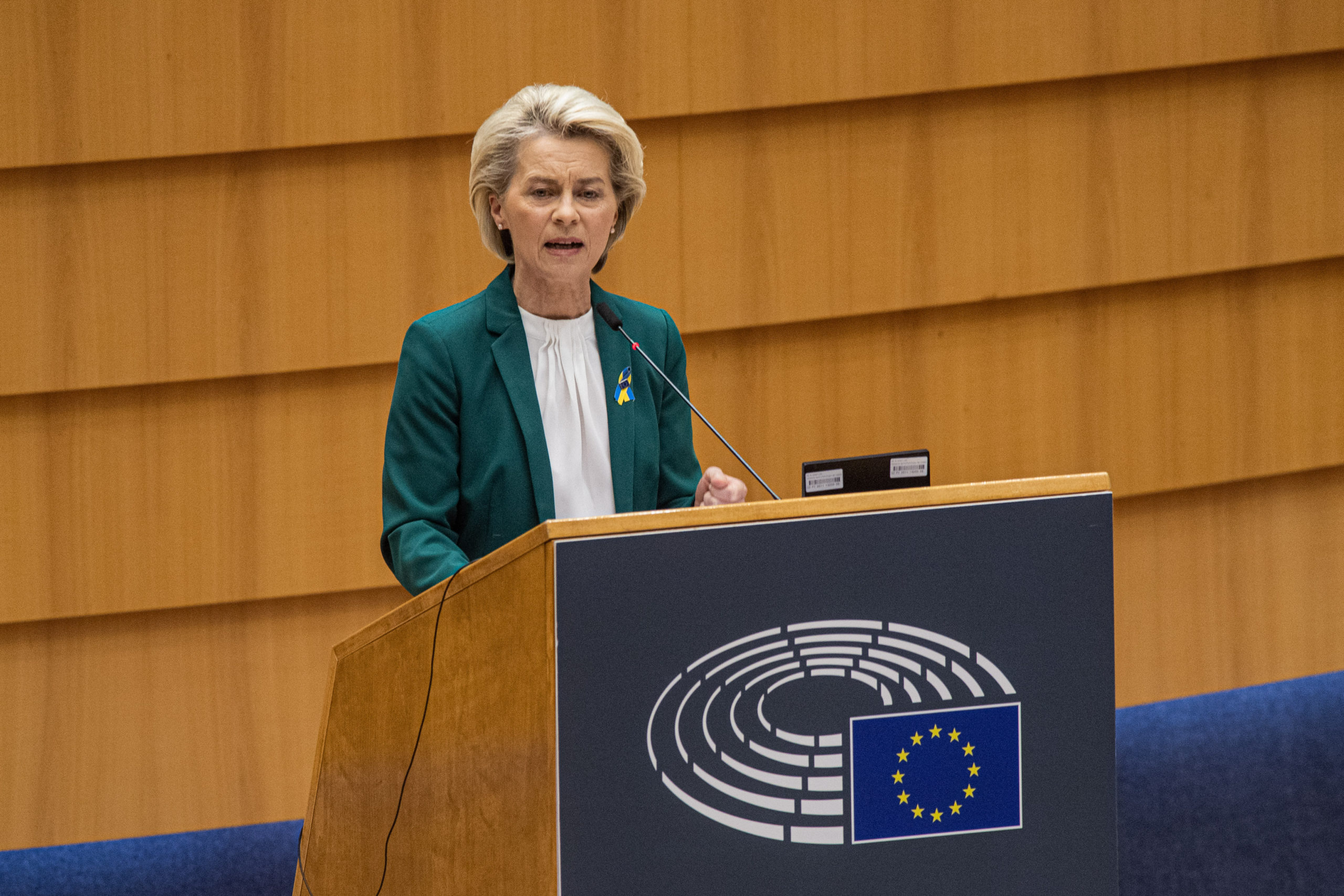
European Commission President Ursula Von der Leyen addresses the European parliament. Photo: picture alliance/dpa/BELGA | Jonas Roosens
Rather than the political and economic alliance of the EU, Le Pen believes there should be a "Europe of nations" where each country acts by itself and relies on individual partnerships between countries. She is believed to see the Hungarian authoritarian leader Victor Orban in a particularly positive light.
Describing the threat of a Le Pen victory to the EU, former German president Joschka Fischer described it as a "mega distaster".
"The prospect of one of the EU’s founding pillars pursuing an “empty chair” policy in Brussels for the next five years would mean five years of blockage," he wrote in an analysis for Project Syndicate. "There would be no common security policy, no transformation of the EU into a geopolitical actor, no further enlargement, and no deeper integration. And that would be the best-case scenario under a President Le Pen."
- No collaboration on Russia
The support of Putin for far-right parties like the Rassemblement National and the fact that Le Pen has received direct campaign funding from Russia-based banks has raised some serious question marks about her stance on Russia.
Though Le Pen has condemned the invasion of Ukraine, it's hard to see how this would translate into practical support after she takes power. So far, she has rejected sanctions on Russia, arguing that they would only hurt the French people and economy.
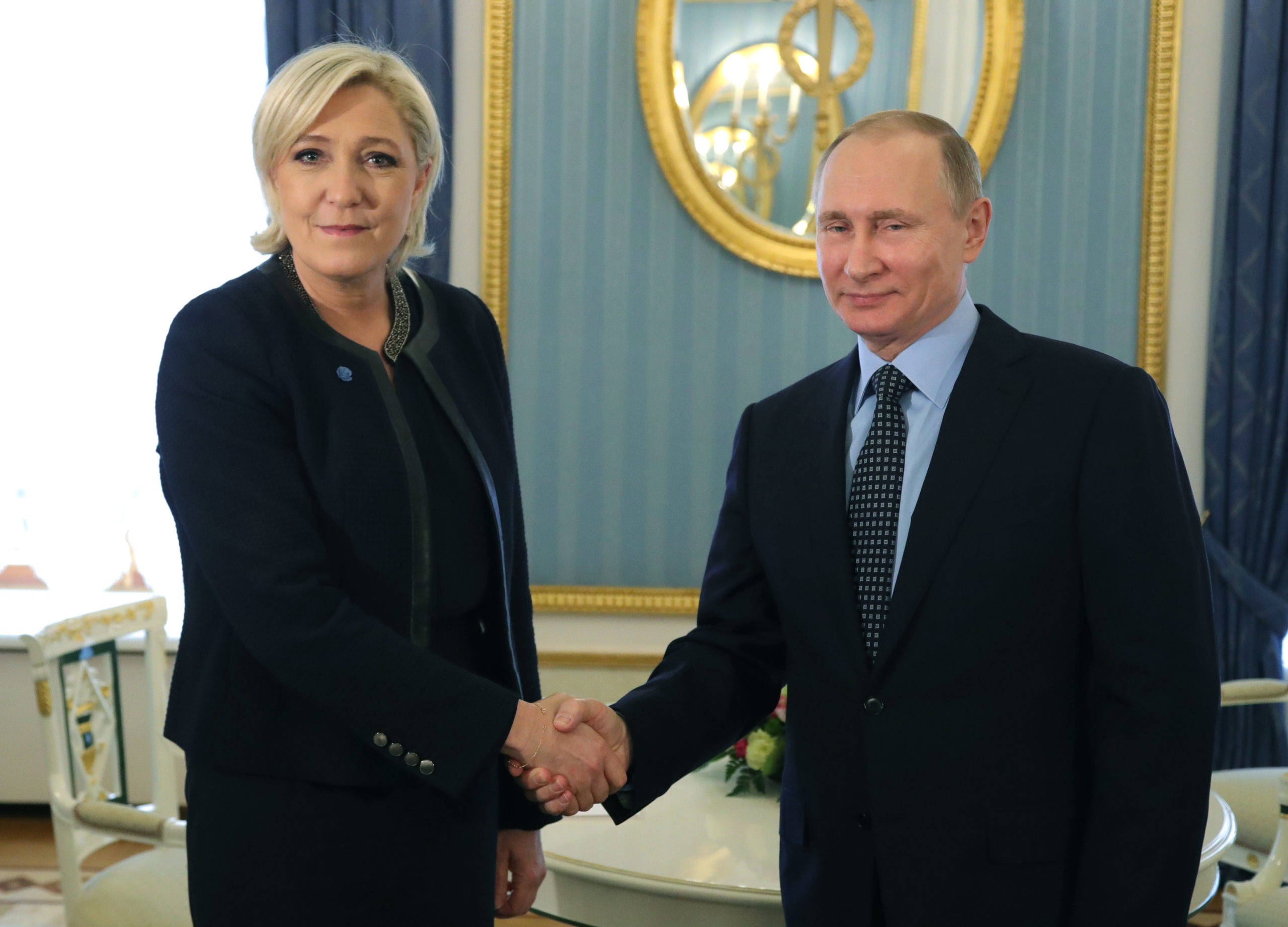
French presidential candidate Marine Le Pen meets Russian President Vladimir Putin at the Kremlin in 2017. Photo: picture alliance / Mikhail Klimentyev/POOL SPUTNIK KREMLIN/AP/dpa | Mikhail Klimentyev
She also wants to end joint military projects between Germany and France such as the development of new fighter jets and tanks. She claims that there are "irreconcilable strategic differences" in the countries' aims and had pledged to replace these with France's own projects. In addition, she would block Germany's application for a permanent seat on the UN Security Council.
Perhaps most worryingly at a time of war, France - the strongest military power in the EU - could withdraw from NATO if Le Pen takes power. France is then likely to move closer to the Kremlin, ultimately standing alone in western Europe.
READ ALSO:
- EXPLAINED: How Germany plans to rebuild its military
- How prepared is Germany in the event of a military attack?
- Divergent energy policies
At a time when Germany's traffic-light coalition is trying to bring about a major transition to renewable energy, a Le Pen win would bring about a huge U-turn on French climate policies.
The far-right politician would not only prevent the development of wind and solar power in the future, but has also pledged to destroy the green infrastructure that has already been built. She would also end subsidies for the renewable energy sector.
From what Le Pen has said in the past months, Germany and France would be likely to butt heads over energy policy in the future - particularly with regard to France's reliance on nuclear power.
"I will not allow Germany to destroy the French nuclear industry," Le Pen has said. Instead, she's keen to convince the Germans of the French model, which would be primarily based on nuclear power and hydrogen.
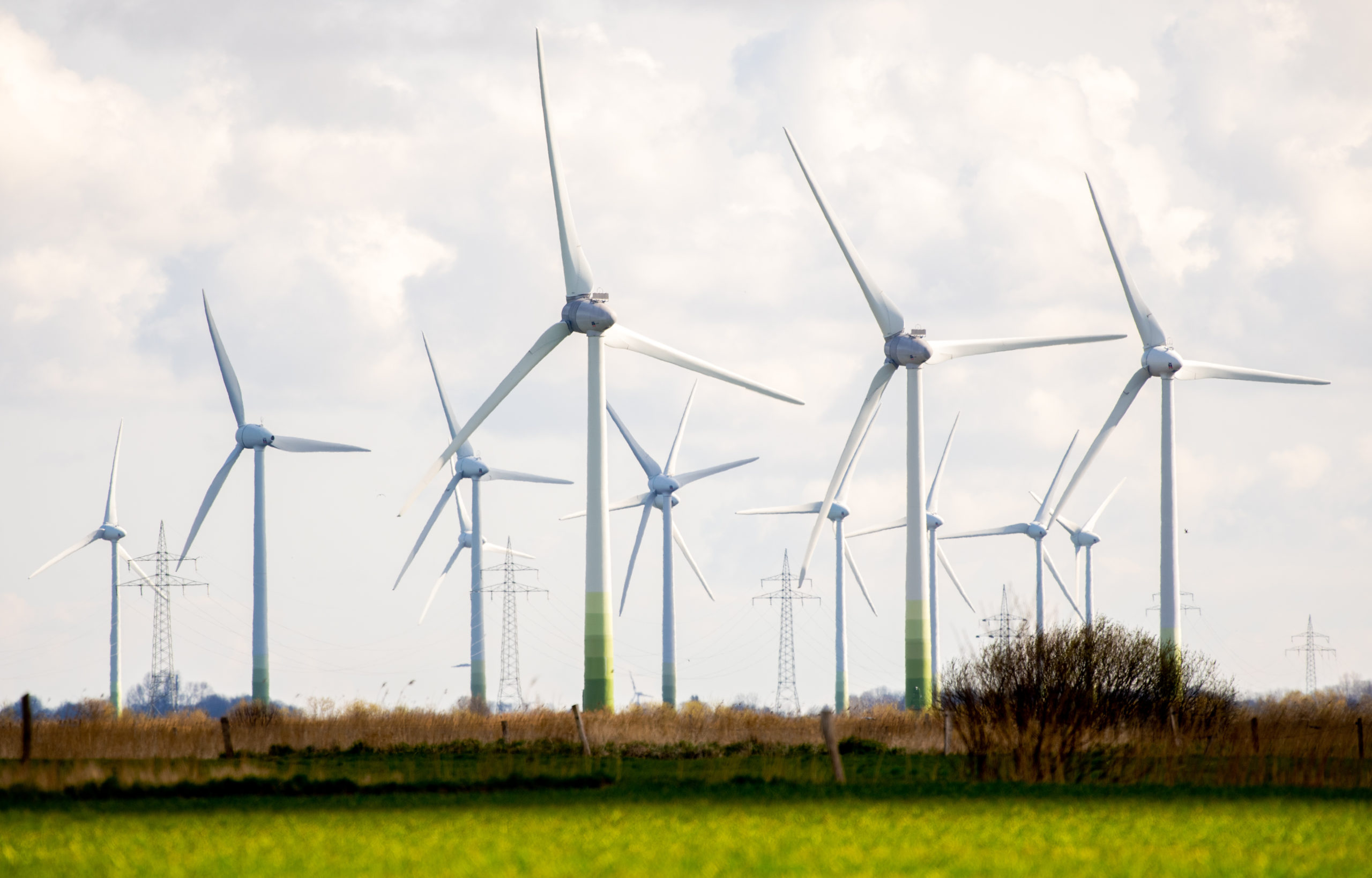
A wind farm in Lower Saxony. Photo: picture alliance/dpa | Hauke-Christian Dittrich
Does Germany have a stance on the election?
Yes. In a comment piece written for French newspaper Le Monde alongside the leaders of Spain and Portugal, Chancellor Olaf Scholz called on the French electorate to choose Macron on Sunday.
The vote is "for us not an election like others," the three European leaders wrote. "France faces a choice between a democratic candidate... and a candidate of the extreme right who openly joins ranks with those who attack our liberty and democracy."
READ ALSO: Leaders of Germany, Spain and Portugal urge French to vote for Macron
Pointing to Le Pen's links to the Kremlin and her acceptance of the annexation of Crimea in 2014, the politicians urged French people to help France remain a "beacon of democracy."
"We should not forget (what Le Pen has done)," they wrote. "Even if these politicians now try to take their distance from the Russian aggressor."
For in-depth coverage of the French elections and live results on Sunday, visit our sister site The Local France.
Comments
See Also
On Sunday, April 24th, the French electorate will face a choice between two radically different politicians: the liberal centrist Emmanuel Macron and the far-right EU-sceptic Marine Le Pen.
In some ways, the situation appears to be very similar to the one that arose five years ago. Both of the same politicians are facing off against each other in the final round of the presidential elections, and Macron appears to have a slight edge over his opponent.
However, the past half a decade has seen Macron battle crisis after crisis, from the Ukraine war to the 'Yellow Vests' protests and the Covid pandemic. That, along with his reputation as a "president of the rich", has taken the shine off his image significantly.
Russia's Ukraine invasion has also cast Le Pen's campaign in a new light. Her party, Rassemblement National, received a €9 million and €2 million loan from Russian-based bank that helped fund her 2017 election campaign. According to imprisoned Russian opposition politician Alexey Navalny, "the bank is Putin's notorious money-laundering outfit".
With the situation made even more tense by the ongoing war on European soil, this could be a decisive election not only for France, but Germany and Europe as a whole. Here's what you need to know.
What do the latest polls say?
According to The Independent, Macron maintained a 12-point lead over Le Pen as the two entered the final stretch of the election campaign on Friday. Politico's poll of polls placed the two politicians closer together, with Le Pen on 45 percent and Macron on 55 percent.
The decisive question on election day will be how many left-wing voters are able to hold their nose and vote for the centrist to stop Le Pen getting in, and how many would-be voters will ultimately stay home. At the moment, pollsters are predicting a historically low turnout on Sunday, with 80 percent of the French electorate describing the campaign as "poor quality" so far.
What would a Macron victory mean for Germany?
- The European "power couple"
Macron's party, En Marche, is a notoriously pro-EU party and the liberal politician has maintained close links with Germany throughout his time in government.
In fact, former Chancellor Angela Merkel had such a friendly relationship with Macron that the two were considered something of a European Traumpaar (dream couple) when Merkel was still in power. His perceived Germanophilia was so strong that there was even a conspiracy theory that he intended to give the Alsace-Lorraine region, which was previously seized by the Germans in the Franco-Prussian war, back to his neighbour.
READ ALSO: ‘France loves you’ – Macron hosts Merkel for farewell visit

Though this is clearly nonsense, the two countries have maintained close links in spite of Germany's change in leadership. When Olaf Scholz (SPD) took the reins of Europe's largest economy, his first diplomatic visit was a lunch date with Macron.
"This visit is a very important moment for building the solid foundations of cooperation between our two countries," Macron said at the time. "Not only for the bilateral relationship itself, but also to discuss European issues, the major international issues."
In a televised election debate on Wednesday, the centrist politician reiterated this view.
"We need a stronger Europe," he said. "This requires a strong Franco-German pair."
He also spoke of the Pfizer/BioNTech vaccine, which was developed in a German laboratory and packaged on French soil, as an example of the strength of Franco-German collaboration.
In his closing speech, Macron said that next Sunday's election was also a plea "for or against the EU, for or against Franco-German relations".
A win for Macron would be very much a win for pro-EU politics in general and would undoubtedly see a continuation of the Franco-German power couple in Europe.
- United stance on Russia
Announcing a wave of sanctions against Russia after its brutal invasion of Ukraine, EU Commission President Ursula von der Leyen said: "If Putin was seeking to divide the European Union, to weaken NATO, and to break the international community, he has achieved exactly the opposite. We are more united than ever and we will stand up in this war, it is for sure that we will overcome and we will prevail. We are united and we stay united."

If Macron wins a second election in France, the signs are that this will continue to be true. France has so far been in favour of tough economic sanctions against Putin and his oligarch network, as well as the delivery of weapons to support Ukraine's fight against its aggressor. Macron has also long been in favour of establishing a European army, and the war in Russia appears to have shored up his ambitions for common defence policies across the bloc.
“We can no longer depend on others to feed us, care for us, inform us, finance us,” Macron said in a speech in March. “We cannot depend on others to defend us, whether on land, at sea, under the sea, in the air, in space or in cyberspace. In this respect, our European defence must take a new step forward.”
READ ALSO: ANALYSIS: Just how quickly could Germany wean itself off Russian gas?
And what would a Le Pen victory mean for Germany?
- Tense Franco-German relations
A win for the Le Pen would mark a sea change after years of close collaboration between France and Germany, and indeed within Europe. "She hates Germany," was the blunt assessment of French political scientist Henri Ménudier on Deutschlandfunk this week.
According to Ménudier, Le Pen is furious at what she sees as Germany's overly dominant political and economic role within the EU. In Wednesday's TV debate, she fumed over the fact that German cars were, in her view, given preference over French ones. "The Germans are putting their foot down hard," she said.
Most notably, the far-right politician has next to no political allies or links in Germany, aside from the anti-migrant AfD. In one of her first speeches on foreign policy in the election campaign, she said she wanted to end the "French blindness towards Berlin" that had existed during the Merkel and Macron years.
- Breakdown of the EU?
According to some experts, a win for Le Pen could be the start of the disintegration of the European project. Though the right-winger has said she doesn't intend to take France out of the European Union, some believe her plans for fundamental EU reform could amount to a Frexit-by-stealth.
Le Pen wants to drastically reduce the amount of money France sends to Brussels - a policy which is bound to put her on a collision course with both the EU Commission and Germany. She has also said that French law should take precedence over EU law to free the country from the "straightjacket of Brussels". She wants to erect hard borders around France and end the free movement of people, goods and services.

Rather than the political and economic alliance of the EU, Le Pen believes there should be a "Europe of nations" where each country acts by itself and relies on individual partnerships between countries. She is believed to see the Hungarian authoritarian leader Victor Orban in a particularly positive light.
Describing the threat of a Le Pen victory to the EU, former German president Joschka Fischer described it as a "mega distaster".
"The prospect of one of the EU’s founding pillars pursuing an “empty chair” policy in Brussels for the next five years would mean five years of blockage," he wrote in an analysis for Project Syndicate. "There would be no common security policy, no transformation of the EU into a geopolitical actor, no further enlargement, and no deeper integration. And that would be the best-case scenario under a President Le Pen."
- No collaboration on Russia
The support of Putin for far-right parties like the Rassemblement National and the fact that Le Pen has received direct campaign funding from Russia-based banks has raised some serious question marks about her stance on Russia.
Though Le Pen has condemned the invasion of Ukraine, it's hard to see how this would translate into practical support after she takes power. So far, she has rejected sanctions on Russia, arguing that they would only hurt the French people and economy.

She also wants to end joint military projects between Germany and France such as the development of new fighter jets and tanks. She claims that there are "irreconcilable strategic differences" in the countries' aims and had pledged to replace these with France's own projects. In addition, she would block Germany's application for a permanent seat on the UN Security Council.
Perhaps most worryingly at a time of war, France - the strongest military power in the EU - could withdraw from NATO if Le Pen takes power. France is then likely to move closer to the Kremlin, ultimately standing alone in western Europe.
READ ALSO:
- EXPLAINED: How Germany plans to rebuild its military
- How prepared is Germany in the event of a military attack?
- Divergent energy policies
At a time when Germany's traffic-light coalition is trying to bring about a major transition to renewable energy, a Le Pen win would bring about a huge U-turn on French climate policies.
The far-right politician would not only prevent the development of wind and solar power in the future, but has also pledged to destroy the green infrastructure that has already been built. She would also end subsidies for the renewable energy sector.
From what Le Pen has said in the past months, Germany and France would be likely to butt heads over energy policy in the future - particularly with regard to France's reliance on nuclear power.
"I will not allow Germany to destroy the French nuclear industry," Le Pen has said. Instead, she's keen to convince the Germans of the French model, which would be primarily based on nuclear power and hydrogen.

Does Germany have a stance on the election?
Yes. In a comment piece written for French newspaper Le Monde alongside the leaders of Spain and Portugal, Chancellor Olaf Scholz called on the French electorate to choose Macron on Sunday.
The vote is "for us not an election like others," the three European leaders wrote. "France faces a choice between a democratic candidate... and a candidate of the extreme right who openly joins ranks with those who attack our liberty and democracy."
READ ALSO: Leaders of Germany, Spain and Portugal urge French to vote for Macron
Pointing to Le Pen's links to the Kremlin and her acceptance of the annexation of Crimea in 2014, the politicians urged French people to help France remain a "beacon of democracy."
"We should not forget (what Le Pen has done)," they wrote. "Even if these politicians now try to take their distance from the Russian aggressor."
For in-depth coverage of the French elections and live results on Sunday, visit our sister site The Local France.
Join the conversation in our comments section below. Share your own views and experience and if you have a question or suggestion for our journalists then email us at [email protected].
Please keep comments civil, constructive and on topic – and make sure to read our terms of use before getting involved.
Please log in here to leave a comment.